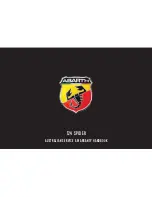
3-26
FITTING SUPERSCTRUCTURES
D
AILY
Base - 02/2012
Printed 603.95.241
Installation of tanks and containers for bulk materials
b) In order to determine elastic connections, take into account the rigidity of the vehicle chassis, of the areas where the connections
are to be applied and the type of use.
For on road vehicles, generally the first front elastic connection should allow for a separation of a few mm between sub-frame
and chassis during the torsion of the vehicle chassis.
c)
Installation of tanks directly on the chassis can be performed under the following conditions:
-
the distance of the various supports must be determined according to the load to be transmitted (generally with distances
no greater than 800 mm);
-
the supports must be created for the uniform distribution of the load, on a sufficiently wide surface area and with appropriate
bracing to contain longitudinal and transversal forces;
-
anchors must be sufficiently long (approx. 400 mm) and must be placed in close proximity with the fittings of the
suspensions.
In particular, choose elastic characteristics for the front anchoring which are suitable to allow the necessary torsional
movements of the vehicle chassis;
-
other anchoring solutions must be authorized by IVECO.
Self standing tanks can be placed directly on the vehicle chassis if suitable supports are used, located immediately behind the cab
and in the rear axle area. Quantity and distribution of the supports depend on the wheelbase and at least two for each side must
be fitted, e.g. for short wheelbase vehicles.
To ensure that the max allowed limits for the axles are respected, the max values of volume, container filling level and volume weight
of transported goods must be determined. In tanks and single container with separated compartments, not only the max limits on
axles but also the minimum ratio between front axle and overall weight of the vehicle at full load must be respected under any filling
condition (see point 1.15).
Depending on the type of version, take particular care in limiting the height of the centre of gravity as much as possible in order
to ensure good stability when the vehicle is driving (see point 1.15); we recommend using vehicles fitted with stabiliser bars.
Suitable transversal and longitudinal bulkheads must be fitted in cistern and tanks for fluids. Indeed, if these containers are not
completely filled, the dynamic forces generated by the fluid during driving could have a negative impact on the driving and resistance
conditions of the vehicle.
When installing containers for flammable fluids, also strictly comply with current safety regulations.
Summary of Contents for DAILY M.Y. 2012
Page 1: ...DAILY M Y 2012 BODYBUILDERS INSTRUCTIONS L I G H T R A N G E ISSUE 2012 ...
Page 4: ...Base 02 2012 Printed 603 95 241 Update data ...
Page 8: ...Index of section Base 02 2012 Printed 603 95 241 ...
Page 10: ...1 2 GENERAL SPECIFICATIONS DAILY Base 02 2012 Printed 603 95 241 Index ...
Page 26: ...1 18 GENERAL SPECIFICATIONS DAILY Base 02 2012 Printed 603 95 241 Convention ...
Page 30: ...2 4 CHASSIS MODIFICATIONS DAILY Base 02 2012 Printed 603 95 241 Index ...
Page 98: ...2 72 CHASSIS MODIFICATIONS DAILY Base 02 2012 Printed 603 95 241 Chocks ...
Page 140: ...4 2 POWER TAKE OFFS DAILY Base 02 2012 Printed 603 95 241 Index ...
Page 214: ...A 2 APPENDIX A DAILY PASSENGER TRANSPORT DAILY Base 02 2012 Printed 603 95 241 Index ...
















































